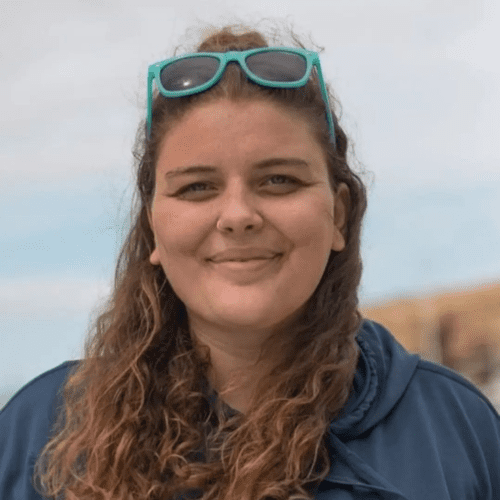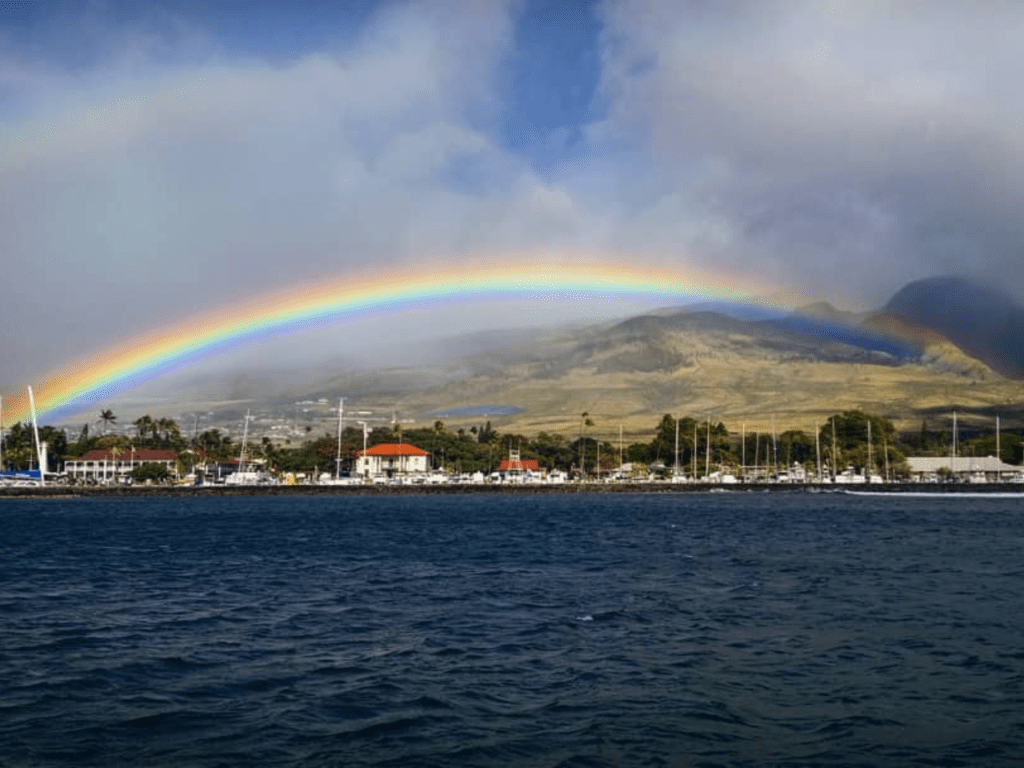Race against fire: Lahaina resident’s tense hours of survival on a shoreline turned warzone
Our voices became raspy whispers, choked by the toxic fumes. Holding hands, we tapped each other occasionally, fighting off drowsiness. As I flickered out of consciousness, seemingly in a trance, I glimpsed surreal blue lights waltzing with one another.
- 11 months ago
September 8, 2023

LAHAINA, Maui — In the early morning, a looming storm and power outage at the office led me to work from home. The Wi-Fi and cell service went out around 11:00 a.m., so I began working with my hands crafting palm frond roses. I saw a notification on Instagram of a contained fire nearby but thought little of it. After all, we experienced frequent fires in the area. By 4:00 p.m. the chirping of smoke detectors shattered my sense of calm.
I stepped outside and encountered a fast-moving cloud of smoke propelled by 80 mile-per-hour winds with no evacuation alert to warn us. I dashed to my car to charge my phone and ran back inside to pack a go-bag, only to find flames advancing a block away upon my return to my car.
Recognizing the immediate threat, I put my bag and pet bird in the car, checked that my neighbors had escape plans, and offered people rides. My upstairs neighbor Edna [or Etina] had persuaded her 86-year-old friend Freeman to evacuate. Rather than take a ride, they opted to head toward Front Street by foot. They hoped the ocean would offer them refuge. As I watched them walk away through the smoky haze, a flying, flaming piece of debris ignited the parking lot they crossed.
Read more stories of the recent Maui fires stories at Orato World Media
Facing gridlock on Front Street, I abandoned my car and pet, escaped to the ocean for safety
With visibility plunged to zero, I relied on memory to find my way out. I drove two blocks to Front Street, only to be met with gridlock. As I sat there waiting, a smoke-afflicted tourist knocked on my window. I let him in my car and we debated evacuation routes. I favored the ocean, but he feared toxic fumes. Eventually, he got out, ran off, and disappearing into the flames.
Realizing the gridlock was not going to change, I moved my car aside, thinking I would let emergency vehicles through if they arrived. Surprisingly, Freeman and Edna found me. Embers had burned Freeman’s shirt but thankfully Edna put them out. We prioritized getting Freeman over a rock wall towards the ocean, considering his limited mobility.
Back in my car, my survival instincts kicked into high gear and I relied on training I had received in the past. I hastily sifted through my go-bag for essentials, savoring the last moments of fresh air inside the car. Disbelief washed over me. One minute I was safe; the next, a fire engulfed my town. Trapped in my car, I weighed the option of diving into the ocean with my remaining belongings. It wasn’t fear that gripped me, but an overwhelming sense of how wildly unpredictable life became.
When the building next to my car caught fire, I made the heartbreaking decision to leave my baby bird behind as I stepped out. Years of experience on boats and participation in Coast Guard drills equipped me for moments like this, influencing each decision I made. I focused on survival.
Clear thinking remained my lifeline, Lahaina survivors anchored on the shore
On the beach, I sent texts to my mom, best friend, and boss explaining the rapidly deteriorating situation. It felt surreal. My words contained no fear, just disbelief. I leaped over a rocky ridge to reunite with Edna and Freeman. Edna became my guardian angel that night, prioritizing our survival. While I came prepared, Freeman had not. His scorched shirt was a bleak warning of the danger we were in.
Our strategy changed constantly to meet the fluidity of the situation. Relying on instinct and training, we navigated through what could have been our last night on earth. We leaned on each other, capitalizing on our strengths and adaptability rather than depending on luck.
Our first collective decision was to stay anchored on the shore, steering clear of the ocean’s unpredictability. To mitigate the risk of embers, Edna and I immediately soaked our hair. We noticed families and seniors surrounding us in dry clothing and sprung into action.
We either drenched their clothing ourselves or instructed them to do so. Edna kept us aware of the shifting winds and the potential respiratory risks throughout the night. Inspired by her selflessness, I felt compelled to do more for others.
Edna made a call and urged me to contact my mom and tell her I was safe. Suddenly, two Lahaina residents named Michelle and Kevin approached us. Panic etched lines on their faces. Seeing Michelle nearly bolt towards the fire, I grabbed her. “We’re going to survive, but you need to stay near the water,” I insisted.
Gratitude filled Kevin’s eyes. Michelle’s dad remained in a building on the other side of flames. Edna passed her the phone. “Tell your dad to evacuate,” she said. Later, at the shelter, Michelle reported that her dad escaped but was hospitalized for smoke inhalation.
Car explosions and flying debris push us into the ocean, death loomed nearby
The fire roared down Front Street, reducing buildings to ashes. Embers fell like hellish rain, forcing our eyes to squint through black smoke. Cars exploded one after another, hurling debris skyward. We took refuge by the shore behind a rock wall. My knowledge of marine biology flashed warnings. Ocean risks included hypothermia, poor visibility, and lurking sharks in the murky waters.
Freeman, whose face was partially masked, stayed cheerful despite the visible pain he was in. He became our beacon of hope. He threw out a spirited shaka [a friendly Hawaiian gesture] as we huddled around him in a 10-foot radius. Then, suddenly, cars near the rock wall exploded propelling shards of metal over it. We faced a decision point.
With Freeman’s encouraging nod, we ventured farther from the shore and placed ourselves down the rock wall in a gap between parked cars. At that point, I could not breathe. Silence became an unstated agreement between us.
Gasping for air, Edna and I headed back into the water and submerged ourselves up to our necks. We approached our breaking points. Our voices became raspy whispers, choked by the toxic fumes. Holding hands, we tapped each other occasionally, fighting off drowsiness. As I flickered out of consciousness, seemingly in a trance, I glimpsed surreal blue lights waltzing with one another.
Each lapse felt like a brush with death, only to be snapped back when my face hit the water. From afar, Edna heard Freeman say, “I just want to look at Lahaina one more time.”
I managed to call 911 and a truck light shattered the darkness in Lahaina
Eventually, the air cleared, and we could breathe and talk normally again. Despite the odds, we survived, shivering but thankful. Back on shore, I approached Freeman. My heart suddenly sank when I realized he had died. My only peace came from knowing he did not die alone.
The rest of us took turns climbing the rock wall to get a view and warming ourselves by the fire to fend off hypothermia. I scaled it repeatedly. Cold water can drain body heat rapidly, and the chill becomes unbearable. Not to mention, we experienced intense smoke inhalation. As I took in the scene, I realized many others in the ocean seriously suffered or worse.
Around 9:30 p.m., I managed to call 911. We held up in a rocky, shallow area which complicated our rescue. Coast Guard and local boats scoured the waters, offering us a hopeful sign. We dodged burning debris and embers, some still ablaze as the ocean carried them to shore. We had to extinguish those to ensure our safety. Guided by another survivor in communication with the Coast Guard, we reached the edge of the rock wall, ready for rescue. Only then did I realize the scale of our situation: 40 of us stranded.
My spirit sank when I realized our only possible means of escape relied on a surfboard. The thought of losing my only remaining belongings devastated me. Then a fire truck light shattered the darkness. A young man tossed me his headlamp and jumped on the surfboard. Taking it as a sign, I flashed SOS with the lamp while shouting for others to follow suit.
Preparedness is important but community is essential, the unexpected is our new reality
Fire department trucks approached the debris field’s edge but couldn’t advance. Firefighters trekked to us on foot, leading us back. Navigating through broken glass, melted metal, downed lines, and rubble while missing one shoe, my journey grew increasingly difficult.
Once aboard, the plan seemed clear: drive north to a bus in Napili, destined for the Wahikuli shelter. However, flames soon obstructed our path. Our only option was to navigate to a nearby parking lot that miraculously avoided the destruction.
With the fire a block away, a moment of contemplation overcame me. A giggle slipped out, as the challenge before us seemed almost trivial compared to the night’s earlier chaos. So much so, that I even managed a brief 10-minute nap. We remained in that parking lot for another two hours and then the path cleared. It was well past 3:00 a.m. when we finally reached the shelter.
The importance of emergency preparedness cannot be emphasized enough. With the increasing frequency of wildfires and storms, it’s tempting to believe, “It won’t happen here.” Yet, the unexpected has become our new reality.
In Lahaina, the concept of ‘ohana extends to everyone. Each unaccounted-for individual feels like a lost family member, adding to our collective emotional burden. The Aloha spirit thrives here, and our community rallied together in the shelters. Music played, people danced, and we lifted each other’s spirits in remarkable ways, especially in the absence of government assistance.
This experience transformed me into an advocate for personal safety training. The rising casualty count underscores the life-saving value of preparedness. Strangely, it was only after the immediate danger had passed that I truly felt the full weight of the situation, inundated by a delayed flood of emotions.
As I prepare to leave for the mainland, the resilience of Lahaina’s community resonates deeply within me, especially as we face an uncertain future. This experience serves as a reminder that preparedness goes beyond stocking an emergency kit; it involves nurturing the bonds that sustain us when systems collapse.
Community isn’t just a safety net; it’s the lifeline that pulls us through when everything else crumbles.




























































































































































































